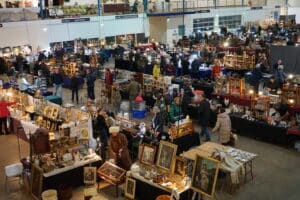
Discussing trade vs. retail. When I started working in the antiques industry, buying at auction was deemed buying at ‘trade’, and buying from a dealer was deemed ‘retail’. And price levels typically matched that. But things were already on the move.
An auction was held during the week, you really needed to view the objects before you bought them (also only during the week), a certain level of knowledge was required to properly understand a catalogue, photographs were few and far between, and the spectre of caveat emptor was ever-present. It was the world of the dealer, and the serious, experienced collector who booked precious holiday days off work to get their fix.
How things have changed. An auction house isn’t worth its salt now unless it has glossy, fully illustrated catalogues, friendly suitably expert staff able to give detailed condition reports and, most recently,
However, with these extra services, commissions taken from both ends of the transaction have crept up. An auction house can now take up to 50% of the hammer price from fees charged to both the seller and the buyer. These include the seller’s commission of around 15%, any lotting or cataloguing fees, photography and insurance fees and, of course the buyer’s premium, which can top 29% including V.A.T. When you consider quite how much an auction house can reap from a sale, the much-maligned ‘dealer’s mark-up’ doesn’t look so bad. My partner, who works in merchant banking, is always shocked by the high transaction fees in our world and comments that they’d be a tenth, if that, of that sum in the financial industry. But a lot more sweat goes into (literally) shifting our stuff around…
This movement from trade to retail puts auction houses in direct competition with dealers for dwindling amounts of disposable income after household bills, taxes and, err, life. That’s a problem enough, but the movement also presents other problems. Firstly, auctions were traditionally the main sources where dealers did most stocking up – much like the ‘cash and carry’ for corner shops, or vast Indo-Chinese factories for high street retailers. Secondly, nearly all good auction houses archive their sales online now, so a Google search can reveal when an item was sold and how much it fetched. Unless it was mis-catalogued or a sleeper, of course. Even though these events are considerably rarer now (again due to the internet), this is still where the hard-working specialist dealer can win.
Unlike the high street retailer or the corner shop, however, dealing is not (and can arguably no longer be) just a case of buying something, price-tagging it and making it look appealing on display. A good dealer, especially the specialist, researches it and may also restore it to its former glory, all at their own cost and risk. Sadly, I do wonder how much the average person cares about that these days. Especially as, potentially, a few key strokes could ‘save them money’ and reveal some of the information behind an object, be it right or wrong. The time, effort and strong dose of luck behind bringing the object to sale isn’t thought about.
Some dealers are fighting back against the auctioneers. The big cheese of a major British auction house told me last month that his biggest competition when competing for a private collection now is from dealers. Long-established or financially successful dealers can raise sums from banks or group together to make an offer there and then, which will take away the obvious risks of an auction. But this only applies to maybe 10% of the dealing world. Where does everyone else go?
Large ‘trade’ fairs like Newark, Ardingly, Lincoln and Swinderby have always been vital keys, and cross the boundary of trade and retail perfectly. Auction houses also rarely venture into them. A dealer may think something would sell better at auction than at a fair, but you never see auctioneers taking stands at a fair to take lots in. I typically spend nearly a whole day at one, and still wish for more time, returning with boot-a-groaning. You can’t put what is being sold on the net, you can negotiate direct with a human being, inspect the item, discuss and learn about it, and hopefully reach a price that makes both happy and then take it away. You never know what you’ll find, although you’ll always find something to surprise and delight. These fairs attract a global audience of buyers and sellers and create a microcosm of the trade for a few days that benefits dealers, but also decorators and collectors.
The primary reason they benefit the trade is that they allow dealers to trade amongst only themselves at set-up, and also have a dedicated ‘trade’ day to which members of the public are not specifically encouraged to come. Many collectors and antiques lovers complain about these, wanting an even playing field for all. Please don’t complain, you’re not a dealer and your livelihood doesn’t depend on such events. You’re also not in a situation where your main source is now pretty much competition against you. The last thing dealers need is for their buyers to be the same. So, trade vs. retail can sometimes go hand in hand.






